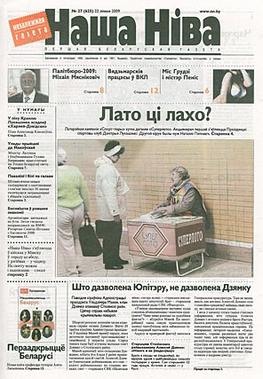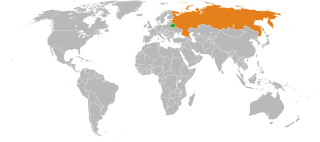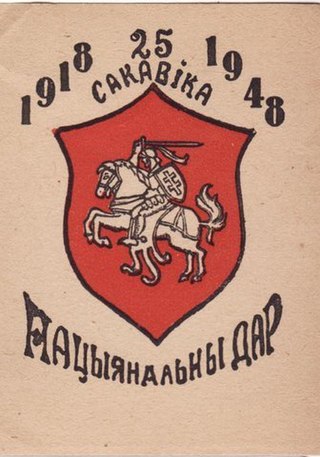
Belarus, officially the Republic of Belarus, is a landlocked country in Eastern Europe. It is bordered by Russia to the east and northeast, Ukraine to the south, Poland to the west, and Lithuania and Latvia to the northwest. Covering an area of 207,600 square kilometres (80,200 sq mi) and with a population of 9.2 million, Belarus is the 13th-largest and the 20th-most populous country in Europe. The country has a hemiboreal climate and is administratively divided into six regions. Minsk is the capital and largest city; it is administered separately as a city with special status.

The Byelorussian SSR was one of only two Soviet republics to be separate members of the United Nations. Both republics and the Soviet Union joined the UN when the organization was founded in 1945.
The mass media in Belarus consists of TV, radio, newspapers, magazines, cinema, and Internet-based websites/portals. The media is monopolized by the government, which owns all TV channels, most of the radio and print media. Broadcasting is mostly in Russian, and Russian media are widely present. After 2020, all independent media were pushed out of the country. The Law on Mass Media has been repeatedly amended and tightened, making it virtually impossible for independent journalists and publications to operate. European, Ukrainian and news websites were blocked in Belarus. The Constitution of Belarus guarantees freedom of speech, but this is contradicted in practice by repressive and restrictive laws. Arbitrary detention, arrests, and harassment of journalists are frequent in Belarus. Anti-extremism legislation targets independent journalism, including material considered unfavourable to the president. As of 2023, Belarus ranks 157th in the World Press Freedom Index. BBC describes the Belarusian media environment as one of the most repressive in Europe.

Alexander Grigoryevich Lukashenko is a Belarusian politician who has been the president of Belarus since the office's establishment in 1994. This makes him the longest-serving European president.

The BPF Party is a banned political party in Belarus. It was de facto established after the split of the social movement Belarusian Popular Front in 1999. The Belarusian Popular Front was founded during the Perestroika era by members of the Belarusian intelligentsia, including Vasil Bykaŭ. Its first and most charismatic leader was Zianon Pazniak.

Belarus elects on national level a head of state—the president—and a legislature. The president is elected for a five-year term by the people. The National Assembly has two chambers. The House of Representatives has 110 members elected in single-seat constituencies elected for a four-year term. The Council of the Republic has 64 members, 56 members indirectly elected and eight members appointed by the president.

The Belarusian Association of Journalists (BAJ) is a Belarusian professional association of journalists from independent media, created in 1995 to protect freedom of speech, freedom of information, promote the professional standards of journalism, conduct monitoring of Belarusian press, and offer legal support to all media workers.

Nasha Niva is one of the oldest Belarusian weekly newspapers, founded in 1906 and re-established in 1991. Nasha Niva became a cultural symbol, due to the newspaper's importance as a publisher of Belarusian literature and as a pioneer of Belarusian language journalism, the years before the October Revolution are often referred to as the 'Nasha Niva Period'.
Andrej Dyńko is a Belarusian journalist. In 2000-2006 he served the chief editor of the oldest Belarusian weekly newspaper Naša Niva. Later he headed magazines Nasha Historyja, Arche, and publications for children in the Belarusian language Dudu and Asciarozhna: dzieci!

Mutual relations between the Republic of Belarus and the European Union (EU) were initially established after the European Economic Community recognised Belarusian independence in 1991.
Censorship in Belarus, although prohibited by the country's constitution, is enforced by a number of laws. These include a law that makes insulting the president punishable by up to five years in prison, and another that makes criticizing Belarus abroad punishable by up to two years in prison.

Belarus and Russia share a land border and constitute the supranational Union State. Several treaties have been concluded between the two nations bilaterally. Russia is Belarus' largest and most important economic and political partner. Both are members of various international organizations, including the Commonwealth of Independent States, the Eurasian Economic Union, the Collective Security Treaty Organization, and the United Nations.

Belarus and Ukraine are both are full members of the Baku Initiative and Central European Initiative. In 2020, during the Belarusian protests against president Lukashenko, the relationship between Ukraine and Belarus began to deteriorate, after the Ukrainian government criticized Belarusian president Alexander Lukashenko. In the waning days of 2021, the relationship between both countries rapidly deteriorated, culminating in a full-scale invasion on 24 February 2022. Belarus has allowed the stationing of Russian troops and equipment in its territory and its use as a springboard for offensives into northern Ukraine but has denied the presence of Belarusian troops in Ukraine. Even though part of the Russian invasion was launched from Belarus, Ukraine did not break off diplomatic relations with Belarus, but remain frozen.

The government of Belarus is criticized for its human rights violations and persecution of non-governmental organisations, independent journalists, national minorities, and opposition politicians. In a testimony to the United States Senate Committee on Foreign Relations, former United States Secretary of State Condoleezza Rice labeled Belarus as one of the world's six "outposts of tyranny". In response, the Belarusian government called the assessment "quite far from reality". During 2020 Belarusian presidential election and protests, the number of political prisoners recognized by Viasna Human Rights Centre rose dramatically to 1062 as of 16 February 2022. Several people died after the use of unlawful and abusive force by law enforcement officials during 2020 protests. According to Amnesty International, the authorities didn't investigate violations during protests but instead harassed those who challenged their version of events. In July 2021, the authorities launched a campaign against the remaining non-governmental organizations, liquidating at least 270 of them by October, including all previously registered human rights organizations in the country.

Taraškievica or Belarusian Classical Orthography is a variant of orthography of the Belarusian language, based on the literary norm of the modern Belarusian language, the first normalization of which was made by Branislaŭ Taraškievič in 1918, and was in official use in Belarus until the Belarusian orthography reform of 1933. Since 1933, Taraškievica has been used informally in Belarus and by the Belarusian diaspora abroad. In a more common sense Taraškievica is sometimes considered to be a linguistic norm.

Andrzej Poczobut is a Belarusian and Polish journalist and activist of the Polish minority in Belarus. He lives in Hrodna, Belarus.

Andrej Kotljarchuk is a Swedish historian of Belarusian descent. His research focuses on ethnic minorities and role of experts’ communities, mass violence and the politics of memory.

Volha Hapeyeva is a Belarusian poet, writer, translator, and linguist. Hapeyeva holds a doctorate in comparative linguistics and has taught at two universities, in Minsk and Vilnius.

The Third Constituent Charter is a legal act adopted by the Rada of the Belarusian Democratic Republic on 25 March 1918 in Minsk, according to which the Belarusian People's Republic was proclaimed an independent state. The anniversary of this historic event is traditionally celebrated by Belarusians as the Freedom Day.













